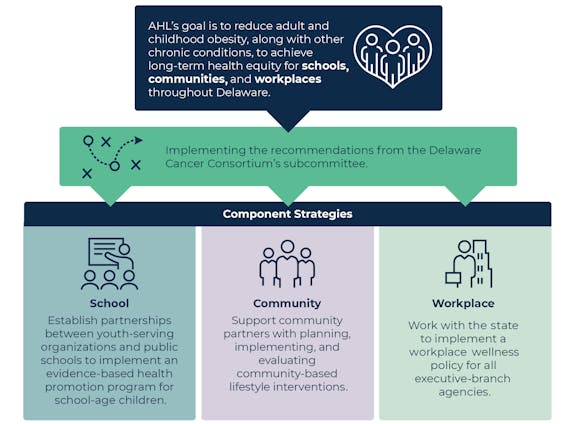Advancing Healthy Lifestyles
Chronic Disease, Health Equity, and COVID-19
Advancing Healthy Lifestyles Coalition
The AHL Coalition kick-off meeting will be held on September 19, 2023
Become a memberView the 2025 Advancing Healthy Lifestyles Conference
AHL Coalition
Learn MoreMini-Grant Awards
Learn MoreSchool Health and Wellness
Learn MoreCommunity Capacity Building
Learn MoreWorkplace Wellness
Learn MoreBriefs and Reports
Learn MoreLearning Series
Learn MoreThe Goal for AHL
Advancing Healthy Lifestyles (AHL) is part of the Division of Public Health’s Physical Activity, Nutrition, and Obesity Prevention (PANO) Program. AHL’s goal is to reduce adult and childhood obesity, along with other chronic conditions, to achieve long-term health equity for schools, communities, and workplaces throughout Delaware.
Healthy Lifestyles Subcommittee Policy Recommendations, January 2021We are accomplishing this by addressing:
- The policies, systems, and environments that impact the social determinants of health (SDoH)
- The health inequities that communities experience
- A shared agenda and narrative developed and adopted, together

PANO Action Plan Development
AHL spearheaded the development of a statewide action plan to implement the recommendations of the Delaware Cancer Consortium’s Cancer Risk Reduction Committee’s Healthy Lifestyles Subcommittee (HLSC). In January 2021, the HLSC released a series of policy recommendations that focused on improving health in three key areas: (1) children ages 0 to 18, (2) worksite wellness, and (3) community-level policies. The action plan translates the HLSC’s recommendations into specific strategies.
To develop the action plan, a survey was distributed to various community partners, including service providers, advocacy organizations, and state and local entities throughout Delaware, to gather input on the HLSC’s recommendations. Building on the survey, a series of focus group discussions using the World Café format took place. More than 50 community partners attended, commenting on each of the HLSC’s recommendations. After the conclusion of the World Café series, Advancing Healthy Lifestyles held several interviews with state agency leaders.
The action plan proposes practical strategies to address the HLSC’s recommendations and identifies the state agency or program that should implement the recommendations, based on the information collected through the survey, focus group discussions, and interviews with state agency leaders. The final action plan provides guidance for next steps to implement each HLSC recommendation.